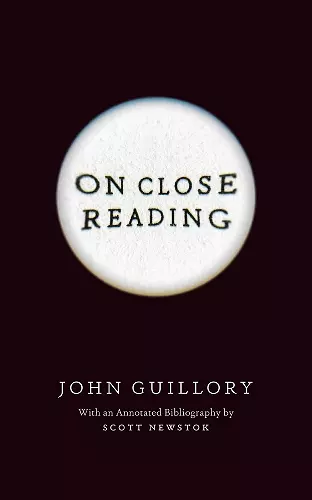On Close Reading
Professor John Guillory author
Format:Paperback
Publisher:The University of Chicago Press
Published:8th Jan '25
Currently unavailable, our supplier has not provided us a restock date

John Guillory considers close reading within the larger history of reading and writing as cultural techniques.
At a time of debate about the future of “English” as a discipline and the fundamental methods of literary study, few terms appear more frequently than “close reading,” now widely regarded as the core practice of literary study. But what exactly is close reading, and where did it come from? Here John Guillory, author of the acclaimed Professing Criticism, takes up two puzzles. First, why did the New Critics—who supposedly made close reading central to literary study—so seldom use the term? And second, why have scholars not been better able to define close reading?
For Guillory, these puzzles are intertwined. The literary critics of the interwar period, he argues, weren’t aiming to devise a method of reading at all. These critics were most urgently concerned with establishing the judgment of literature on more rigorous grounds than previously obtained in criticism. Guillory understands close reading as a technique, a particular kind of methodical procedure that can be described but not prescribed, and that is transmitted largely by demonstration and imitation.
Guillory’s short book will be essential reading for all college teachers of literature. An annotated bibliography, curated by Scott Newstok, provides a guide to key documents in the history of close reading along with valuable suggestions for further research.
“On Close Reading is destined to become a classic. Guillory offers a fresh account of the practice of close reading and its place in the work of academic literary critics. On Close Reading mounts a powerful argument for viewing technique as a form of knowledge—that is, as a form of science.” * Frances Ferguson, University of Chicago *
“In this compact and incisive study, Guillory shows how close reading is attended by mysteries that have long escaped discussion, then untangles these perplexities with meticulousness and flair. Alert to the institutional pressures shaping literary study, yet committed to close reading’s social value, our leading historian of criticism presents an inquiry as groundbreaking as it is air-clearing. Scott Newstok’s annotated bibliography, a treasure in itself, elegantly complements Guillory’s investigation.” * Douglas Mao, Johns Hopkins University *
“As always, Guillory comes in cool, concise, and comprehensive, demystifying one crucial thread in our discipline’s myth of origins. In and even after the age of mass literacy, close reading remains an underspecified method, a vital practice we use both to approximate and to negate scientific knowledge, the last ember of a Promethean fire that still defines the literary humanities.” * Jed Esty, University of Pennsylvania *
“No one has illuminated the situation of literary studies in our time with more power than Guillory. This marvelous volume lays bare the history and theory of a technique so central to the discipline that it is usually taken for granted, but which Guillory reveals as a sign of literature’s vexed relation to a wider world.” * Mark McGurl, Stanford University *
"Close reading, [Guillory] proposes, may not be in and of itself a virtue, but it may offer a small private resistance to wide-scale industrialization and automation. It may not save literature, but it will make sure that certain forms of phenomenal experience remain open to us . . . the idea of close reading as something modelled and handed down may offer a kind of companionship: that collaborative exchange Guillory calls 'mutual imitation'." * Times Literary Supplement *
“Guillory has devoted his career to examining the social functions performed by the academic discipline of literary studies . . . Like everything English professors do, close reading has been loaded down with baggage both by its proponents and its critics. Thus one of Guillory’s primary goals in his latest book is to clear away all of the associations that have accumulated around it . . . Guillory’s terse, no-nonsense defense avoids the risk of overplaying his hand—a risk courted by close reading’s early advocates.” -- Timothy Aubry * Chronicle of Higher Education *
“On Close Reading has all the richness we have come to expect from [Guillory] . . . Put together, the efforts of Guillory and Newstok make On Close Reading a book that is incredibly valuable for thinking about the concepts our work relies upon—and for putting these concepts into practice.” * Modern Philology *
“A formidable historian of academic criticism, Guillory strikes a moderate tone in the book, one that is both sceptical of assumptions made about close reading—and yet one that affirms the value of the literary word . . . Guillory’s book is a necessary reminder that accepted critical terms and tendencies should be questioned and reconsidered, lest they lead to lazy reading and thought.” * Catholic Herald *
“Guillory’s goal in this slim volume to convince us that reading, and in particular, the practice of ‘close reading,’ is a technique . . . Guillory wants to avoid endlessly theorizing close reading because like all techniques, he says, it is better understood via demonstration and imitation.” * 3 Quarks Daily *
"As one of English literature’s most prominent U.S. academics, Guillory’s books never fail to make a splash . . . On Close Reading provides a provocation for the ongoing debates about literary education, clarifying both the historical contingencies and enduring complexities of the method. Guillory’s insistence on close reading as techne rather than a rigidly proceduralized act offers a compelling framework for both scholars and teachers navigating its contemporary mandate and relevance." * Teachers College Record *
ISBN: 9780226837437
Dimensions: 203mm x 127mm x 15mm
Weight: 172g
144 pages